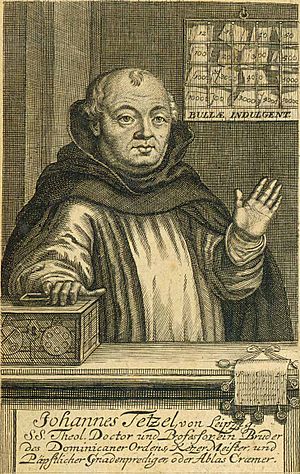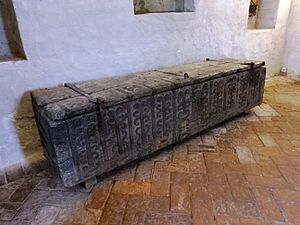Johann Tetzel facts for kids
Quick facts for kids
Johann Tetzel
|
|
|---|---|
 |
|
| Born | c. 1465 Pirna, Electorate of Saxony
|
| Died | 11 August 1519 (aged 53–54) Leipzig, Electorate of Saxony
|
| Nationality | German |
| Occupation | Dominican preacher |
| Known for | Selling indulgences |
Johann Tetzel OP (c. 1465 – 11 August 1519) was a German Dominican friar and preacher. He was appointed Inquisitor for Poland and Saxony, later becoming the Grand Commissioner for indulgences in Germany. Tetzel was known for granting indulgences on behalf of the Catholic Church in exchange for money, which grant a remission of temporal punishment due to sin, the guilt of which has been forgiven, a position heavily challenged by Martin Luther. This contributed to the Reformation. The main usage of the indulgences sold by Johann Tetzel was to help fund and build the new St. Peter's Basilica in Rome.
Life
Tetzel was born in Pirna, Saxony, and studied theology and philosophy at Leipzig University. He entered the Dominican order in 1489, achieved some success as a preacher, and was in 1502 commissioned by Cardinal Giovanni de' Medici, later Pope Leo X, to preach the Jubilee indulgence, which he did throughout his life. In 1509 he was made an inquisitor of Poland and, in January 1517 was made commissioner of indulgences for Archbishop Albrecht von Brandenburg in the dioceses of Magdeburg and Halberstadt.
He acquired the degree of Licentiate of Sacred Theology in the University of Frankfurt an der Oder in 1517, and then of Doctor of Sacred Theology in 1518, by defending in two disputations, the doctrine of indulgences against Martin Luther. The accusation that he had sold full forgiveness for sins not yet committed caused a great scandal. It was believed that all of the money that Tetzel raised was for the ongoing reconstruction of St. Peter's Basilica, although half the money went to the Archbishop of Mainz, Cardinal Albert of Brandenburg (under whose authority Tetzel was operating), to pay off the debts incurred in securing Albert's appointment to the archbishopric.
Tetzel was also condemned (though later pardoned) for immorality. When he discovered that Karl von Miltitz had accused him of perpetrating numerous frauds and embezzlements, he withdrew, broken in spirit, wrecked in health, into the Dominican monastery in Leipzig. Miltitz was later discredited to the point where his claims carry no historical weight.
Tetzel died in Leipzig in 1519. At the time of his death, Tetzel had fallen into disrepute and was shunned by the public.
When Luther heard that Tetzel was mortally ill and on his deathbed, he wrote to comfort him and bade him "not to be troubled, for the matter did not begin on his account, but the child had quite a different father." After his death, he was given an honorable burial and interred before the high altar of the Dominican Church in Leipzig.
Doctrinal positions
Tetzel overstated Catholic doctrine in regard to indulgences for the dead. He became known for a couplet attributed to him:
This oft-quoted saying was by no means representative of the official Catholic teaching on indulgences, but rather, more a reflection of Tetzel's capacity to exaggerate. Yet if Tetzel overstated the matter in regard to indulgences for the dead, his teaching on indulgences for the living was pure Catholic teaching. The German Catholic historian Ludwig von Pastor explains:
Luther's impression
Luther claimed, that Tetzel had received a substantial amount of money at Leipzig, from a nobleman asking him for a letter of indulgence for a future sin. Supposedly Tetzel answered in the affirmative, insisting that the payment had to be made at once. The nobleman did so and received a letter and seal from Tetzel.
However, when Tetzel left Leipzig the nobleman attacked him along the way, and gave him a thorough beating, sending him back empty-handed to Leipzig, with the comment that it was the future sin which he had in mind. Duke George at first was quite furious about the incident, but when he heard the whole story, he let it go without punishing the nobleman.
..... However, Tetzel obtained affidavits from authorities at Halle, both civil and ecclesiastical, who swore that Tetzel never made any such claim.
See also
 In Spanish: Johann Tetzel para niños
In Spanish: Johann Tetzel para niños



